Unit 1 What are you going to do Lesson 2 课件1
五年级下册英语教案- Unit 1 We are going to read stories 第一课

五年级下册英语教案- Unit 1 We are going to read stories 第一课时湘少版(三起)教学目标1.学习并掌握新单词及短语:story, read, love, draw, tell, book, is, are2.学会用“be going to”表达将要进行的动作3.听、说、读、写交际用语:What are you going to do? I am going to read stories.4.通过阅读故事来培养学生的阅读能力和表达能力,并增强对英语学习的兴趣。
教学重点1.学习并掌握新单词及短语,尤其是be going to的用法2.了解并运用交际用语:What are you going to do? I am going to read stories.3.提高学生的阅读能力和表达能力教学难点1.辨析和正确运用be going to和will的区别及用法2.通过阅读故事来培养学生的阅读能力和表达能力教学准备1.教师准备课件和教学素材(包括故事书、听力材料等)2.学生备好笔和本子教学过程Step 1. Warm-up1.导入新课,让学生们热身,为学习新课做好准备。
2.让学生们依次进行自我介绍,并表达一下今天的心情。
例如:My name is Tom, I am excited to learn English today!3.引导学生们说出对学习阅读英语的期望和想法。
Step 2. Presentation1.展示故事书,引导学生们试图猜测故事内容。
2.给学生讲解一些新单词和短语的意思,例如story, read, love, draw, tell, book, is, are。
3.介绍“be going to”的用法,以及它与will的区别和联系。
4.向学生介绍故事书的情节,引导学生们在舒适的氛围中听故事,培养阅读能力。
Step 3. Practice1.让学生们跟读故事,并向学生提问,让学生观察并学习故事中的语言表达方式。
黄冈英语六年级上课堂达标测试卷(U1-4)

Unit1 TV and RadioLesson1 Let’s Watch TV!I.Write the words.1.quiet(反义词)________2.good(比较级)_________3.good(反义词)_________4.actor(复数形式)_______5.two(同义词)__________II.Choose the best answer.( )1.We often_______TV on Sundays.A.seeB. watchC.lookD. listen ( )2.I don‟t have _______homework today.A.someB.littleC.lotsD.any ( )3._______do you turn it on?A.whatB.whoC.HowD.Where ( )4.______you like this one?A.AreB.DoC.DoesD.Is( )5.What‟s your ________animal?A.lukeB.bestC.favouriteD.better ( )6.I like the green one________.A.goodB.goodestC.bestD.most III.Read and fill in the blanks.1. 我可以打开电视吗?____I____ ___the TV?2. 我认为李连杰是一个好演员。
I_____LiLianjie is a_______ _______. 3. 为什么丹尼最喜欢那个演员?______does Danny like that actor_____?4. 在他们中间你最喜欢谁?______do you like _______amony them?5. 这个电视节目中有很多演员。
This______ ______has many______. IV.Change the forms of the sentences.1.I have some apples in my bag.(改为否定句)___________________________________2.Y ou‟re welcom.(改为同义句)___________________________________3.I like this red one.(改为一般疑问句)_______________________________________ 4.My favourite actor is ChengLong.(对划线部分提问)______________________________________ 5.My favourite fruit is orange.(改为同义句) _____________________________________ plete the dialogue.A:Do you ___1____english?B:No,I_____2_______.A:____3___you favourite subject(科目)B:I like P.E.___4___.A:__5__do you like it best?B:Because ____6___execiting(令人惊喜的). A:____7___you P.E. teacher?B:Mr Wu.A:I know ____8____a good teacher.Lesson 2I.Look and write the words.1.小提琴_________2.钢琴_________3.吉他_________4.音乐_______II.Translation.1.弹吉他_________2. 拉二胡_________3.一周三次_________4. 一天一次_________5. 一个弹钢琴的人_________III. Choose the best answer.( )1.I can play _______ violin.A.aB. anC.theD. /( )2.Can you play _______football?A.aB. anC.theD. /( )3. Y ao Ming is a basketball _______.A.playB.playerC.playingD.players ( )4. I like the piano ______ than the violin.A.bestB.betterC.beterD.bester ( )5. Can you ________ the erhu ?A.playB.playingC.playsD.playes ( )6.That‟s ________ I play it .A.whoB.whatC.whyD.whom IV. Make sentences with the given words1. Danny, player, is, good, piano, a______________________________________?2. plays, day, Li Ming, once, football, a______________________________________.3. play, does, basketball, how, Jenny, often_________________________________?4. playing, Kim, erhu, is, now, the___________________________________? V. Change the forms of the sentences.1. I can do my homework. (改为否定句)____________________________________ 2. I play football once a week . (对画线部分提问)____________________________________ 3. Li Ming is wrting a letter. (对画线部分提问) ______________________________________ 4.Red is my favourite colour. (对画线部分提问)___________________________________Lesson 3 let’s Listen to the RadioI.Write the words.1. sing (-ing 形式)________2. same (反义词)_________3.China (形容词形式)_________4.sing (名词形式)_______5. quiet (反义词) _______II.Read and fill in the blanks.1.I think Liu Huan is a good _______ (歌手).2.Let‟s find a _______ (不同的)radio show.3.Do you like _______ (西方的) music.4.How do you _______ (打开)the radio ?5.Can you _______ (听见) it now?III. Choose the best answer.( )1.Please listen ___me. I‟ll give you a talk.A.inB. toC.atD. on( )2.I can _______your voice.A.listenB. seeC.hearD. look ( )3. The radio _______ Chinese music.A.upB.downC.muchD.on ( )4.Why is the radio _____ Chinese music.A.playingB.playsC.playesD.playying ( )5. Thanks for ________ this radio show.A.findsB.findingC.findingsD.findes IV. Read and fill in the blanks.1.让我们打开电视。
外研版七下U1 What are you going to do at the43课件

What are they going to do?
They are going to They are going to play
watch TV.
volleyball.
They are going to play basketball.
They are going to play soccer.
4. Complete the table Notes about Australia
Ayers Rock 3.6 kilometres and 348 metres high
Everyday English
Would you like to join us? Don’t be silly!
Now answer the questions.
1. What’s Daming going to do on Saturday morning?
He’s going to check his email , do his homework and help with the housework
Two students _a_r_e_g_o_i_n_g_t_oplay chess.
They a_r_e__g_o_in_g__to_ have a picnic. He i_s_g_o_i_n_g_t_o_ fish.
1. Listen and match the words and expression from Box A with the word and expressions from Box B.
swim play table tennis cook
go to park go fishing go over lessons watch TV play yoyo read newspaper
六年级英语上册Lesson 1课件冀教版
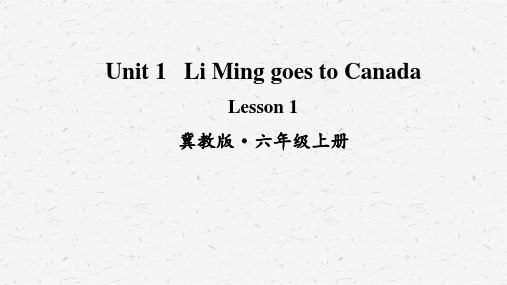
3. What time is it now? 现在是几点了? 此句型用来询问时间,其回答一般为“It is …”
【例句】—What time is it now? 现在几点了? —It’s five o’clock. 现在是5点整。
4. There he is!他在那儿! 此句型为倒装句,用来表示“强调或者感叹”的语气。
Yes, Li Ming's plane will arrive at five o'clock.
What time is it now? It's 4:45. Please sit down.
What time is it now? But I can't see him.
It's 5:15.
a.m.
p.m.
_I_t’_s_2_:_3_0_a_._m__. _in__B_e_ij_i_n_g_. ______________________ _I_t’_s_7_:_3_0_p_._m__. _in__L_o_n_d_o_n_.______________________
正常形式应该是“He is there!” 【例句】Here you are!
给你!
5. Did you have a good trip? 你旅途愉快吗? 这是典型的一般过去时的一般疑问句,其中did为助动词,用
来询问过去发生的事情,其结构为:Did+主语+动词原形+其他? 答语为“Yes,主语+did./ No,主语+didn’t.”。当使用助动词did开头 的一般疑问句时,问句中的动词必须保持原形。 【例句】—Did you swim last Sunday? 你上周日游泳了吗?
新外研版 Starter M3U1 What's this in English 省优获奖课件 2
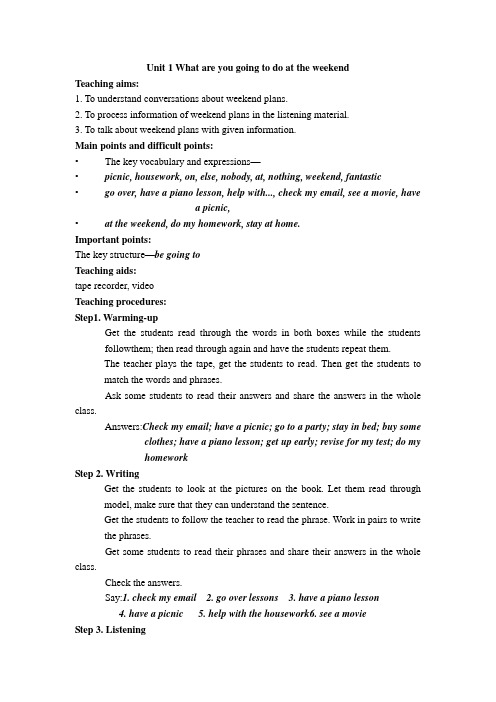
Unit 1 What are you going to do at the weekendTeaching aims:1. To understand conversations about weekend plans.2. To process information of weekend plans in the listening material.3. To talk about weekend plans with given information.Main points and difficult points:•The key vocabulary and expressions—•picnic, housework, on, else, nobody, at, nothing, weekend, fantastic•go over, have a piano lesson, help with..., check my email, see a movie, havea picnic,•at the weekend, do my homework, stay at home.Important points:The key structure—be going toTeaching aids:tape recorder, videoTeaching procedures:Step1. Warming-upGet the students read through the words in both boxes while the students followthem; then read through again and have the students repeat them.The teacher plays the tape, get the students to read. Then get the students to match the words and phrases.Ask some students to read their answers and share the answers in the whole class.Answers:Check my email; have a picnic; go to a party; stay in bed; buy some clothes; have a piano lesson; get up early; revise for my test; do myhomeworkStep 2. WritingGet the students to look at the pictures on the book. Let them read through model, make sure that they can understand the sentence.Get the students to follow the teacher to read the phrase. Work in pairs to write the phrases.Get some students to read their phrases and share their answers in the whole class.Check the answers.Say:1. check my email 2. go over lessons 3. have a piano lesson4. have a picnic5. help with the housework6. see a movieStep 3. Listening1. Get the students to listen to the dialogue, grasp the meaning of it.Listen to the tape again and read through the dialogue by themselves.Get the students to read the dialogue again and answer the questions.Share their answers with their partner.The teacher gets some students to read their answers.Check the answers.Answers:1. He’s going to check his email and do his homework.2. She’s going to see a movie.3. Lingling.4. They are going to meet in the park.2. 知识点讲解做一些一般将来时练习(be going to do sth.句型)Step 4. PracticeUsing the wordsto complete the conversation.(4)Betty: What are your plans for next weekend, LinglingLingling: (1)_______. I don’t have any plans.Betty: Are you going to spend it (2) _____ at homeLingling: Well, … what are you going to doBetty: Tony and I are going to have a picnic in the park.We’re going to have a (3)_______ time. Are you going to comeLingli ng: I’m not sure.Betty: Don’t be (4)____! What (5)___ are you going to doAnswers:Check the answers.Nothing alone fantastic silly elseStep 5.Listening and repeatThe teacher plays the tape and asks the students to follow to read.Play the tape again, pausing for them to repeat. They should do this chorally asa whole class. In groups and individually.Put them in pairs to practice. Encourage them to be critical and help each other get the pronunciation right.Circulate and monitor their production.Step 6. ListeningThe teacher plays the tape and asks the students to follow to read.Play the tape again, pausing for them to repeat. They should do this chorally asa whole class.Put them in pairs to practice the pronunciation of /ai/, /i/ /i:/ . Pay attention to the letter y in some words, like buy, my.Ask some students to read the words. Correct their mistakes.Circulate and monitor their production.StepGet the students to read through the examples so that the students know what to do. Say:A: What are you going to do on Saturday morningB: I’m going to check my email and do my homeworkGet the students to practice the example in pairs. And ask some groups to read.Get the students to finish the board.Step 8. Writing and answeringGet the students to ask and answer.Say:What are you going to do at the weekendWhat is your mother going to do at the weekendStep 9. Oral workIn groups, talk about what your classmates are going to do at the weekend.Choose one or two to give a report to see which is better.Step 10. Writing workWrite a short passage to describe what your father/mother is going to do on Su Module 3HeroesUnit 1She trained hard, so she became a great player laterⅠ. Teaching modelListening and speakingⅡ.Teaching methodCommunicative approachⅢ. Teaching aimsa. Key words:including, medal, attend, abroad, doctor, degree, whatever, amazing, will, victory, simplyb. Key Phrases:once again, give up, attend university, a very strong willc. Everyday English:1. She started playing table tennis when she was five.2.She trained hard, so she became a great player later.3. Her English wasn’t good enough when she began.4. Whatever she does, she never gives up.5. I think she’s a good student as well as a good player.6. She’s simply the best.Ⅳ.Teaching aidsTape recorder, OHP, ppt.Ⅴ.Teaching StepsStep1 Warming-up and listening1. Look at the pictures and talk something about heroes.2. Say something about Deng Yaping.3. Listen and check the correct answers in Activity 2.Step 2 Listen and read1. Listen to the tape carefully.2. Ask the students to read through the conversation individually.3. Deal with the exercises in Activity III and IV.4. Play the tape and have them read and follow.5. Act it out.5.Deal with the important sentences in the dialogue.Step 3 Do ExerciseComplete the passage in Activity 5.Step 5 Explain the important and difficult points1. She trained hard, so she became a great player later. so引导的结果状语从句。
外研版英语七年级下册:Module 3 Unit 1 What are you going to d

教学设计外研版七年级下册课题:Module 3 Making plans Unit 1:What are you going to do at the weekend?一.课型; Listening and speaking二.教材分析本单元是第三模块的核心组成部分,以讨论周末计划为主要话题。
该话题比较贴近学生生活,因此学生对介绍自己的周末计划很感兴趣,很容易展开教学活动,便于学生理解运用。
本节课在学生掌握有关周末活动的动词短语的基础上,在大量听说训练的基础上,通过讨论周末计划,学习用be going to 表达自己打算或计划做的事。
三.学生分析本节课的授课对象是七年级学生,他们活泼好动,善于表现自己,大多数学生对英语学习很感兴趣,尤其是在进行口语练习的环节时,都很积极。
本节课在设计用be going to 谈论周末计划这一话题时,设计了大量的pairwork 练习,便于学生根据自己的实际情况展开活动。
这节课的设计以学生感兴趣内容为出发点,以培养学生的听说能力为目的,使学生积极参与到课堂中来。
并充分利用多媒体等教学辅助设备,加强直观印象,增加课堂教学的趣味性。
四.教学目标根据《中学英语课程标准》制定如下目标:语言知识目标1. 学习掌握本课生词与短语:plan, go over, picnic, have a picnic, nothing,silly, fantastic, nobody, housework, else2. 观察并了解be going to 形式的构成, 能简单使用一般将来时(am/is/are going to do sth)3. 通过用英语与同伴谈论自己和周围人们打算做的事, 进一步熟悉be going to的用法。
语言技能目标1.听:能听懂含有be going to 加动词原形所表达的意思,并能听懂他人谈论周末计划的内容。
2.说:能借助所给词组进行pairwork 练习,能用be going to 谈论周末计划。
北师大英语模块一unit1 lesson3-4课堂练习

Lesson 3 A Volunteer TeacherRead the following interview and pay attention to the verb forms that are used to talk about future.A: Good morning, Wangshu, tell us about your plan, please.B: I’m going to work as a volunteer teacher in a small country town in Inner Mongolia.A: Really? You must be excited. What are you going to do there as a teacher?B: I’m going to teach middle school students. I’ll have lots of lesson plans to make and homework to mark. I will be very busy.A: And when are you leaving?B: The train leaves at 9 tomorrow morning. So I’m getting up at about 6 to get everything ready. A: I’m sure your parents are proud of you. Wish you good luck, Wangshu.B: Thank you very much一般現在時,將來時和現在進行時时态練習1.(06 辽宁)The father as well as children _____ every Sunday afternoon in winter.A. is goingB. goC. goesD. are going2.(06上海) Send my regards to your lovely wife when you _______ home.A. wroteB. will writeC. have writtenD. write3.(08湖南) — Do you have any problems if you ______ this job?—Well, I’m thinking about the salary….A. offerB. will offerC. are offeredD. will be offered4.(06辽宁) I think it is necessary for my 19-year-old son to have his own mobile phone, for I sometimes want to make sure if he _____ home for dinner.A. comeB. comesC. has comeD. will come5. According to the time-table, the train for Shanghai _____ at 7 o’clock in the evening.A. leavesB. has leftC. was leftD. will leave6. (06四川) Look at the timetable. Hurry up! Flight 4026 ____ off at 18:20.A. takesB. tookC. will be takenD. has taken7. Galileo collected facts that proved the earth _____ around the sun.A. movedB. movesC. has movedD. had moved8. ——Can I help you, sir? ——Yes, I bought this radio yesterday, but it ____.A. didn’t workB. won’t workC. can’t workD. doesn’t work9. (06浙江) This machine _______. It hasn’t worked for ye ars.A. didn’ t workB. wasn’ t workingC. doesn’ t workD. isn’ t working10. (06全国) The house belongs to my aunt but she______ here any more.A. hasn't livedB. didn't liveC. hadn't livedD. doesn't live11. Every few years, the coal workers their lungs X-rayed to ensure their health.A. are havingB. haveC. have hadD. had had12. Barbara is easy to recognize as she’s the only one of the women who _____evening dress.A. wearB. wearsC. has wornD. have worn13. The palace caught fire three times in the last century, and little of the original building____now.A. remainsB. is remainedC. is remainingD. has been remained14. The wet weather will continue tomorrow when a cold front _____A. is expected C. expects D. will be expected15. --- Have you seen my e-mail about our TESL project?--- Yes. Luckily, I checked my e-mails yesterday. Normally, I ____ my e-mail-box for days.A.haven’t opened B.didn’t open C.hadn’t opened D.don’t open16. He will come to see you the moment he ______his work.A. will finishB. finishesC. would finishD. had finished17. If their marketing plans succeed,they ____A. will increaseB. have been increasingC. have increasedD. would be increasing18. —Shall I call at your house at seven o’clock tomorrow evening?—I ______ a walk in the park. So you won’t find me at home then.A. shall be takingB. shall takeC. will takeD. am taking19. --- Let’s discuss the question raised last night, shall we?--- There is no hurry for that. I ____ for a conference.A. headedB. was headingC. am headingD. have headed20. Once education is made free,many children who have dropped out of school ____ .A. will come backB. came backC. have come backD. had come back21. --- Ring me at six tomorrow morning, will you? --- Why that early? I ______ .A. will be sleepingB. have sleptC. have been sleepingD. will sleep22. ---Tom has just asked for leave. Why?--- He _____next Tuesday.A. has been marriedB. got marriedC. is getting marriedD. is married23. --- Look at these black clouds . It _______ soon --- Sure. If only we ________ out.A .is raining, didn’t come B. is to rain, won’t start..C. will rain, haven’t startedD. is going to rain, hadn’t come24. M y money ______. I’d better go to the bank to draw some in case I ______ none in hand.A. has run out; will haveB. is running out; haveC. has been run out of; will haveD. is run out; have25. — Sorry, I _______ to buy the book you need for you.— Never mind. _______ it myself after school.A. forget; I’d rather buyB. forgot; I’ll buyC. forgot; I’m going to buyD. forget; I’d better buy26. Ladies and gentlemen, please fasten your seat belts. The plane ________.A. takes offB. is taking offC. has taken offD. took off27. Life _____like a box of chocolate. You never know what you____ get.A.is going to ;willB. is; are going toC. will be; are toD. has been; are about to28. Why not come over at the weekend? The children ______seeing you again.A.enjoyed B.will enjoy C.would enjoy D.have enjoyed29. —We should get together next week. —Sounds like a plan! I ____ you a call.A. will giveB. would giveC. have givenD. give30. I ___ Pingp ong quite well, but I haven’t had time to play since the new year.A. will playB. have playedC. playedD. play31. ---- _______ leave at the end of this month.---- I don’t think you should do that until _____ another job.A. I will; you’ve foundB. I’m going to ; you’ve foundC. I will ; you’d findD. I’m going to ; you’d find32. ----- How can I apply for an online course ?----- Just fill out this form and we ____ what we can do for you.A. seeB. are seeingC. have seenD. will see33. ---- What are you going to do this afternoon ?---- I am going to the cinema with some friends. The film ____ quite early, so we ___ to the bookstore after that.A. finished; are goingB. finished; goC. finishes; are goingD. finishes; go34. Tell John not to leave the house unless he _____ that the lights________.A.will make sure; turn offB. makes sure; are turned offC. will make sure; will turn offD. makes sure; be turned off35. Remember to send me a photo of us next time you ___ to me.A. are writingB. will writeC. has writtenD. write36. Because the shop ________ , all the T-shirt are sold at half price.A. has closed downB. closed downC. is closing downD. had closed down37. Do I have to take this medicine ? It _____ so terrible.A. tastesB. is tastingC. is tastedD. has tasted38. ---- Would you like to tell me what our teacher said just now?---- She said that light _____ faster than sound.A. travelsB. traveledC. would travelD. was traveling39. There ________ a dolphin show in the zoo tomorrow evening.A. wasB. is going to haveC. will haveD. is going to be40. The dark clouds are gathering as if it __________rain.A. willB. wouldC. were going toD. is going toLesson 4 课堂练习I. 根据下列句子所给单词的首字母或汉语提示,写出各单词的正确形式。
人教PEP版-英语-六年级上册-Unit 3重点句型点拨
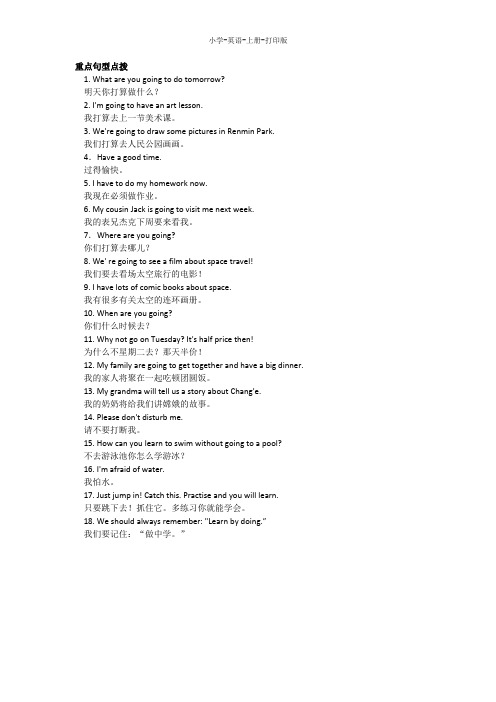
小学-英语-上册-打印版重点句型点拨1. What are you going to do tomorrow?明天你打算做什么?2. I'm going to have an art lesson.我打算去上一节美术课。
3. We're going to draw some pictures in Renmin Park.我们打算去人民公园画画。
4.Have a good time.过得愉快。
5. I have to do my homework now.我现在必须做作业。
6. My cousin Jack is going to visit me next week.我的表兄杰克下周要来看我。
7.Where are you going?你们打算去哪儿?8. We' re going to see a film about space travel!我们要去看场太空旅行的电影!9. I have lots of comic books about space.我有很多有关太空的连环画册。
10. When are you going?你们什么时候去?11. Why not go on Tuesday? It's half price then!为什么不星期二去?那天半价!12. My family are going to get together and have a big dinner. 我的家人将聚在一起吃顿团圆饭。
13. My grandma will tell us a story about Chang'e.我的奶奶将给我们讲嫦娥的故事。
14. Please don't disturb me.请不要打断我。
15. How can you learn to swim without going to a pool?不去游泳池你怎么学游冰?16. I'm afraid of water.我怕水。
外研社七年级英语下Unit 1 What are you going to do at the weekend?
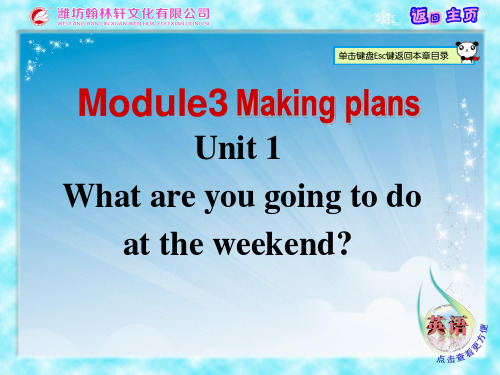
morning
Saturday Sunday
afternoon evening morning afternoon evening
You Check email do homework
Your partner
Quiz
play table tennis
What are you going to do ? I am going to play table tennis.
play the piano
What is he going to do this evening? He is going to play the piano this evening .
useful expressions
Words: picnic, housework, on, else, nobody, at, nothing, weekend, fantastic
Phrases: go over, have a piano lesson, help with..., check my email, see a movie, have a picnic, at the weekend, do my homework, stay at home. sentences: What are you going to do at the weekend? I’m going to… Would you like to join us ? Yes, I’d love to.
alone else fantastic nothing silly
Betty: What are your plans for next weekend, Lingling? Lingling: (1)_N_o_t_h_i_n_g. I don’t have any plans. Betty: Are you going to spend it (2) _a_lo_n_e_ at home? Lingling: Well… What are you going to do? Betty: Tony and I are going to have a picnic in the park. We’re going to have a (3)_fa_n_t_a_s_ti_ctime. Are you going to come? Lingling: I’m not sure. Betty: Don’t be (4)_si_l_ly_! What (5)_el_s_e are you going to do?
外研版英语七下试题 Module 3 Unit 1 What are you going to do at the weekend

Module 3 Unit 1 What are you going to do at the weekend?A 当堂检测Ⅰ.词汇运用A)根据句意及首字母提示补全单词。
1.--What e do you want to eat?--No,thank you.I’m full(饱的).2.--Who is at home?--N .All of them go out.3.There is n in the bag.It’s empty.4.They will arrive in Beijing a 7 pm.B)根据句意及汉语提示写出单词。
1.How (愚蠢的)the old man is !2.He is very happy because he gets a (极好的)job.3.I’m going to take the kids for a (野餐) in the park after school.4.He always helps his mother with the (家务劳动).Ⅱ.英译汉1.go over2.have a picnic3.check one’s email4.see a movie5.have a piano lesson6.in the park7.stay at home alone8.help with the houseworkⅢ.句型考查1.are you at the weekend,Daming?大明,你周末打算干什么?2.Saturday morning,I'm check my email and domy homework.周六上午我打算查看电子邮件并写作业。
3.is going to be there?谁还会去那里?4.-- you us?“你想加入我们吗?”--Yes.I’d“是的,我想加入。
”5.-- are your the weekend?“你的周末计划是什么?”--Nothing.“没什么事。
module3_unit1_What_are_you_going_to_do_at_the_weekend

一般将来时 用来谈论将来,与表示将来的时间连用;表示将 来发生的动作和存在的状态。 谓语动词构成形式: be going to +动词原形 (表示某人打算/计划做某事) 1.肯定句: 主语+ be going to +动词原形 1) 我打算在早上查看一下电子邮件。 Iam going to check my email in the morning. ______________ 2) 他打算在周末去野餐。 is going to have a picnic He ________________________ at the weekend.
表位移的动词都可以o用现在进行时表“将来 ”,表示按计划或安排不久“将要发生的” 动作。常见的位移动词有: come, go leave Start arrive f#43;位移动词ing+地点 They ____(leave)for Shuiquan this afternoon. 答案:are leaving My mother isn’t here now,She ____later. e B. coming C.has come D.is coming
The language points
1. at/on the weekend: 在周末 有关的名词。星期几,某个特定
on表“时间”,后面常跟与“一天” 节日,某一天的上下午。
Tom often goes fishing____Sunday morning. A. at B.on C.in
2.介词at,in,on表示时间的用法:
alone lonely 区别 alone侧重说明客观情况,强调形体上的“单 独”。 lonely 只做形容词,在句中可做定语,修饰 名词,也可以放在be动词之后作表语。“孤 独的,强调精神上孤单”。 一言辨析 I am alone, but I don’t feel lonely.
北师大版高中英语必修1Unit1教案Lesson 3
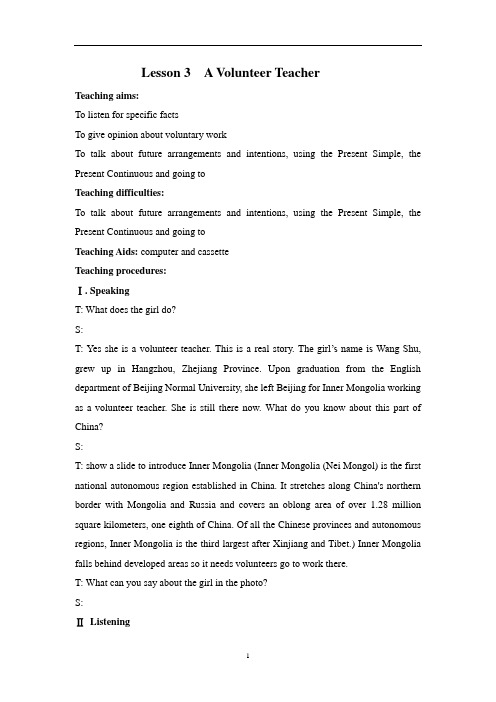
Lesson 3 A Volunteer TeacherTeaching aims:To listen for specific factsTo give opinion about voluntary workTo talk about future arrangements and intentions, using the Present Simple, the Present Continuous and going toTeaching difficulties:To talk about future arrangements and intentions, using the Present Simple, the Present Continuous and going toTeaching Aids: computer and cassetteTeaching procedures:Ⅰ. SpeakingT: What does the girl do?S:T: Yes she is a volunteer teacher. This is a real s tory. The girl’s name is Wang Shu, grew up in Hangzhou, Zhejiang Province. Upon graduation from the English department of Beijing Normal University, she left Beijing for Inner Mongolia working as a volunteer teacher. She is still there now. What do you know about this part of China?S:T: show a slide to introduce Inner Mongolia (Inner Mongolia (Nei Mongol) is the first national autonomous region established in China. It stretches along China's northern border with Mongolia and Russia and covers an oblong area of over 1.28 million square kilometers, one eighth of China. Of all the Chinese provinces and autonomous regions, Inner Mongolia is the third largest after Xinjiang and Tibet.) Inner Mongolia falls behind developed areas so it needs volunteers go to work there.T:What can you say about the girl in the photo?S:ⅡListeningStudents read the questions and predict the answersT: I think you must be interested in Wang Shu, now listen to the interview, you will learn more about her and answer these questions.Students listen to the tape and check their predictions.Students listen to the tape again and make sure of the answersStudents work in pairs and take turns to retell Wang Shu’s storyⅢVoice your opinionIs it a good idea to do voluntary work? What reasons do people have for doing voluntary work?ⅣVocabularyDo the exercise 5.Students work individually, thinking about the cues and what they are going to do. Students read the sentences, decide which words to use, and then complete the sentences.ⅤGrammarDo the exercise 6Listen to the interview again. Pay attention to these sentences from the interview. What verb forms are used to talk about the future?Guide students to draw the following conclusion:present Simplepresent Continuousgoing to + infinitivedo consolidate exercise7, 8and 9explain further grammar:Expressing future arrangements and intentions:be going to-- to express an intention to do something.Present Continuous-- to talk about future events that we have already fixed or arranged.Present Simple-- to talk about official events or timetables which we cannot change.be going to do 与be doing 的区别be going to do 表示事先经过考虑过,然后计划好将做某事;迹象将发生某事。
外研社初中英语七年级下册Module3_Unit1What_are_you_going_to_do_

Step 6 : Let’s guess
What are the people going to do at the weekend?
What is he going to do at the weekend?
He’s going to play basketball at the weekend.
a. Lingling is going to have a piano lesson.
b. She’s going to see a movie. c. They’re going to meet in the park at one o’clock. d. He’s going to check his email.
What is she going to do at the weekend?
She’s going to ride a horse at the weekend.
What are they going to do at the weekend?
They’re going to have a picnic at the weekend.
What are you going to do tomorrow morning?
I’m going to do my homework.
What are you going to do this evening?
I’m going to go over my lessons.
What are you going to do next Friday? I’m going to go to a party.
Step 1. Look and say
What are they doing?
外研版七年级英语下册module3教案

Module 3 Making plansUnit 1 What are you going to do at the weekend?一、教学目标 :1. 语言知识目标:1) 掌握本单元所学单词及短语:go over, picnic, housework, on, else, nobody, at,nothing, silly, fantastic...2) 掌握be going to do的用法。
2. 情感态度价值观目标:利用所学表达制订计划的句型有礼貌地邀请别人参加某种活动二、教学重难点:1、利用所给信息谈论周末计划2、“be going to +动词原形”句型的用法三、教学过程Step 1 Warming-up1. Show some pictures of school things. Say what they are.2. Read the words after the teacher.3. Introduce the new words.Step 2 Match1. Ask the students to read the word and expressions in Activity 1.2. Match the words and expressions from Box A with the word and expressionsfrom Box B.3. Call back the answer from the whole class and check the answer.4. Match the expressions in Activity 1 with the pictures in Activity 2.5. Read the expressions together.Step 3 Listen and read.1. Play the recording and ask the students to listen and read the conversation.2. Read the conversation again and answer the questions.1) What’s Daming going to do on Saturday morning?2) What’s Betty going to do on Saturday afternoon?3) Who is going to have a piano lesson on Saturday?4) Where are they going to have a picnic?3. Ask the students to check with a partner.4. Play the recording again .Check the answers..Step 4 Complete the conversation1. Ask the students to read the words in the box in Activity 4.2. Read through the conversation.3. Complete the conversation with the correct form of the words from the box.4. Ask the students to check with a partner.5. Check the answers.6. Read the conversation loudly.Step 5 Listen and repeat1. Play the recording once without stopping.2. Play the recording again and stop at the end of each line. Ask the whole class torepeat.3. Play the recording again and stop at the end of each line. Ask individual studentsto repeat.4. Ask the students to practice the sounds in pairs.Step 6 Work in pairs.Ask and answer questions about your plans at the weekend.1. Ask and answer like this:— What are you going to do on Saturday morning?—I’m going to check my email and do my homework.2. Read through the example with the class.3. Pair them to ask and answer.4. Circulate and monitor their production.5. Complete the diary.Step 7 Language pointsand do my homework.1. On Saturday morning, I’m going to check my email如果特指“在具体的某一天”或“(在具体的某一天的)上午、下午、晚上”等,须用介词on。
满洲里市XX小学四年级英语上册 Unit 1 What are you going to do Le
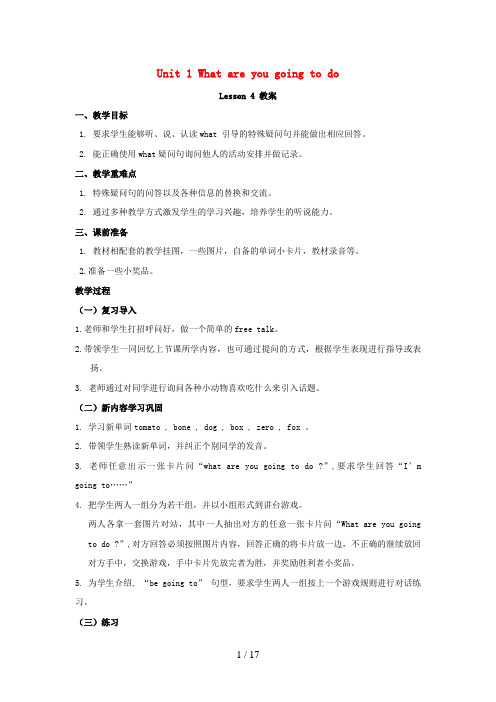
Unit 1 What are you going to doLesson 4 教案一、教学目标1. 要求学生能够听、说、认读what 引导的特殊疑问句并能做出相应回答。
2. 能正确使用what疑问句询问他人的活动安排并做记录。
二、教学重难点1. 特殊疑问句的问答以及各种信息的替换和交流。
2. 通过多种教学方式激发学生的学习兴趣,培养学生的听说能力。
三、课前准备1. 教材相配套的教学挂图,一些图片,自备的单词小卡片,教材录音等。
2.准备一些小奖品。
教学过程(一)复习导入1.老师和学生打招呼问好,做一个简单的free talk。
2.带领学生一同回忆上节课所学内容,也可通过提问的方式,根据学生表现进行指导或表扬。
3. 老师通过对同学进行询问各种小动物喜欢吃什么来引入话题。
(二)新内容学习巩固1. 学习新单词tomato , bone , dog , box , zero , fox 。
2. 带领学生熟读新单词,并纠正个别同学的发音。
3. 老师任意出示一张卡片问“what are you going to do ?”,要求学生回答“I’m going to……”4. 把学生两人一组分为若干组,并以小组形式到讲台游戏。
两人各拿一套图片对站,其中一人抽出对方的任意一张卡片问“What are you going to do ?”,对方回答必须按照图片内容,回答正确的将卡片放一边,不正确的继续放回对方手中,交换游戏,手中卡片先放完者为胜,并奖励胜利者小奖品。
5. 为学生介绍, “be going to”句型,要求学生两人一组按上一个游戏规则进行对话练习。
(三)练习老师放课文录音,让学生听音复述,老师完整的介绍一遍这段对话,并将重点句子写在黑板上。
—What are you going to do ?—I’m going to eat the bones.四、作业1. 听录音,并模仿跟读。
2. 书写单词和句子,熟读课文。
外研版新标准英语七年级下册M3 Unit 1 What are you going to do at the weekend英文教案

Unit 1 What are you going to do at the weekend?(一)【教学目标】:1 功能:计划、打算、意图的表达与询问。
2 语法: be going to 的意义和用法。
3 语音:含有be going to 的句子的读音及L 系列辅音组合的发音。
4任务:(1) be going to 句型介绍自己对一周学习或其他活动的计划安排。
(2) 词汇:1 plan 计划 2 revise 温习;复习 3 picnic 夜餐 4 test 测试(二) 重点:1一般将来时的定义:表示打算、计划、准备、将要做某事。
结构:be going to +动词原形例如:What are you going to do this afternoon?你今天下午打算做什么?2because引导的原因状语从句3 动词词组A teaching plan for Unit 1,Module 3一、Teaching materials:Unit 1 What are you going to do at the weekend? (Module 3 Plans)二、Targets for this period:To understand conversations about planTo get special information from the listening passageTo talk about one’s plan on weekend三、Key points:Key vocabulary—plan to do something, revise for one’s test, have a picnic/part y, have a piano lesson, do some sightseeing, go sightseeing/shopping/cycling, cook dinner, go to the beach, stay in bedKey structures—What is he / she/ your friend going to do on weekend?What are you / they going to do on weekend?四、Teaching methods:Interactive approach五、Teaching aidsTape recorder, OHP六、Teaching arrangements:Step One Lead-in1. Students talk about the following questions in small groups:1) Do you like weekend?2) Why do you like weekend?3) What do you usually do on weekend?2. Show some new phrases and ask the students to remember themplan to do something, revise for one’s test, have a picnic/party, have a piano lesson, do some sightseeing, go sightseeing/shopping/cycling, cook dinner, go to the beach,stay in bedStep Two Presentation1. Show the sentence structure “be going to” with examples and pictures.----What is he going to do? ----He is going to…(将要做某事)----He is going to check his email.----He is going to do his homework.2. Students look at more pictures and make sentences.1) ----What is she going to do?----She is going to have a birthday party / cook dinner / go to Sydney / take the plane / take the boat.2) ----What are they going to do?----They are going to eat dinner / have a party / have a picnic / go to the beach /watch TV / play soccer / go to the theater / buy some clothes / play volleyball.3) ----What is he going to do?----He is going to study for a test / have a piano lesson / go sightseeing / go cycling / play volleyball / play basketball / go swimming / go shopping / go fishing Step Three Listening (Activity 3)1. Students listen to the tape and choose the correct answers. (Activity 4)1) What’s Daming going to do on Saturday morning?D He is going to check his email.H He is going to do his homework.2) What’s Betty going to do on Saturday afternoon?G She is going to buy clothes.3) What’s Betty and Daming going to do on Saturday evening?C They are going to go to the party.4) What are Daming, Betty, Tony and Lingling going to do on Sunday afternoon?A They are going to have a picnic.5) What’s Daming going to do on Sunday morning?F He is going to get up early.I He is going to play table tennis.6) What’s Betty going to do on Sunday morning?B She is going to stay in bed.E She is going to revise for her test.2. Students listen again and complete the diary. (Activity 7)Daming BettySaturday Morning Check email Do homeworkAfternoon Have a piano lesson Buy some clothesEvening Go to a party Listen to some music Go to a party Listen to some music Sunday Morning Get up early Play table tennis Stay in bed Revise for her test Afternoon Meet Lingling and Tony in the park Have a picnic Meet Lingling and Tony in the park Have a picnicevening3. Students ask and answer in pairs according to the diary.e.g. ----What’s Daming going to do on Saturday morning?----He’s going to check his email and do h is homework.Step Four To practice reading aloud the conversation in groups of two.Step Five Detail explanation (Activity 3)1. Would you like to come? = Do you want to come?2. revise sth = go over sthe.g. I must revise my English notes for my exam.Step Six To act out the conversation.Step Seven To listen and repeat (Activity 5&6)Step Eight Summary: be going to do sth. 表示自己打算或计划做某事.be 的形式要根据主语来确定。
Unit 5 Our Holiday Plans Lesson 1 --What are you going to do 句型操练 (2)

I’m going to travel to Beijing.
What are you going to do this winter holiday?
I’m going to travel to Shanghai.
What are you I’m going to going to do this take tennis winter holiday? lessons.
I’m going to buy a toy car.
What are you going to do this winter holiday?
I’m going to ride a bike.
I’m going to What are you going to do this play the winter holiday? chess.
What are you going to do this winter holiday?
I’m going to visit my grandparents.
What are you going to do this winter holiday?
I’m going to travel to play games.
Unit 5 Our Holiday Plans
Lesson 1 --What are you going to do?
句型操练
--What are you going to do? --I’m going to… .
--你将打算做什么? --我将要去…… 。
What are you going to do this winre you going to do this I’m going to winter holiday? play football.
中职英语第一册Unit 2 Lesson 01

Special Difficulties
2. as & like 像 as :(1)as 与单数名词构成短语,表示身份或职业 as + a/an +名词 (2)as用于比较级,或引导一个明喻 as light as a feather 轻若鸿毛 like:介词,与单数名词构成短语,在句子中做状语 like + a/an +名词 He cried like a baby. 他哭的像个小孩。
Unit 2
Lesson 01
Campus
PART 01
Warm-up
Make Full Use of Your School Days
Warm-up
1.What are you going to do when you leave school?
2.What abilities are important in the job market?
New words
• club (n) 俱乐部 • movie (n) 电影 • focus (v) 集中,重点 • mind (n) 心思,注意力 • energy (n) 精力 • course (n) 课程 • future (n) 未来,将来 • status (n) 地位,状态 • depend (v) 依赖,依靠
PART 02
Structure &Grammar
Make Full Use of Your School Days
倍数的表达方法:
1.once 一倍,一次 2.twice 两倍,两次 3.基数词+times 两倍以上
three times 三倍,三次 four times 四倍,四次 49 times / forty-nine times 四十九倍,四十九次 .......
- 1、下载文档前请自行甄别文档内容的完整性,平台不提供额外的编辑、内容补充、找答案等附加服务。
- 2、"仅部分预览"的文档,不可在线预览部分如存在完整性等问题,可反馈申请退款(可完整预览的文档不适用该条件!)。
- 3、如文档侵犯您的权益,请联系客服反馈,我们会尽快为您处理(人工客服工作时间:9:00-18:30)。
—What are you going to do ? —I’m going to ……
—What are you going to do ?
I’m going to buy an ice cream .
—What are you going to do ?
I’m going to play with my pet .
—What are you going to do ?
I’m going to make dumplings.
—What are you going to do ?
I’m going to fly kite .
—What are you going to do ?
I’m going to plant flowers.
She is reading .
Let’s think !
Have you find any differences ?
She is going to do exercise.
She is doing exercise .
She is going to read . She is reading .
What are you going to do to make your pet beautiful ?
I’m going to tie the bell on my pet .
What are you going to do ?
I’m tying the bell on my pet .
Let’s practice !
—What are you going to do ?
I’m going to buy a book .
Kimi is crying .
Kimi is drinking .
She is going to do exercise.
She is doing exercise .
She is going to read .
be going to do and be doing
be going to do 表示将要去 做,打算去做 be doing 表示正在做
Unit 1 What are you going to do? Lesson 2
Let’s talk !
Do you have a pets ? It’s a dog or a cat ?
Cpet dog on bed . On 是介词,表示在……的上面。
